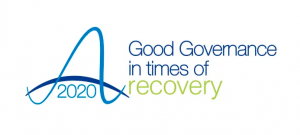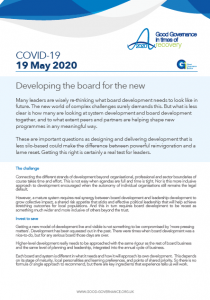Developing the board for the new
19 May 2020

Many leaders are wisely re-thinking what board development needs to look like in future. The new world of complex challenges surely demands this.
But what is less clear is how many are looking at system development and board development together, and to what extent peers and partners are helping shape new programmes in any meaningful way.
These are important questions as designing and delivering development that is less silo-based could make the difference between powerful reinvigoration and a lame reset. Getting this right is certainly a real test for leaders.
The challenge
Connecting the different strands of development beyond organisational, professional and sector boundaries of course takes time and effort. This is not easy when agendas are full and time is tight. Nor is this more inclusive approach to development encouraged when the autonomy of individual organisations still remains the legal default.
However, a mature system requires real synergy between board development and leadership development to grow collective impact, a shared risk appetite that sticks and effective political leadership that will help achieve stretching outcomes for local populations. And this in turn requires board development to be recast as something much wider and more inclusive of others beyond the trust.
Invest to save
Getting a new model of development live and visible is not something to be compromised by ‘more pressing matters’. Development has been squeezed out in the past. There were times when board development was a nice-to-do, but for any serious board those days are over.
Higher-level development really needs to be approached with the same rigour as the rest of board business and the same level of planning and leadership, integrated into the annual cycle of business.
Each board and system is different in what it needs and how it will approach its own development. This depends on its stage of maturity, local personalities and learning preferences, and points of shared priority. So there is no formula or single approach to recommend, but there are key ingredients that experience tells us will work.
System development
Evidence from both our research and delivery work suggests that board development has most impact as a planned programme, not just a series of one-off events. Pragmatically, the latter may appear more realistic for systems at such an early stage of forming. However, recognising the value of an integrated programme of development across old boundaries is what will allow boards and systems to achieve most success.
Big developmental themes need to go beyond silos – for example, the leadership of place-based sustainability or the consequences for partnership working or even how to secure influence in the wider environment.
The governance of future development programmes requires much greater openness, transparency and better collective thinking than is often the case now. The content of one programme needs coordinating with others. And this extends to executive-specific and clinical leadership development and leadership of population health as well. A commitment to one place requires an equal commitment to one development programme.
Any new agenda for better integrated development requires tenacity and creativity to overcome the many obstacles in its way. Hard-edged development may well still be needed to overcome old rivalries and behaviours, and to reinforce new ways of thinking and working.
Sign of maturity
A mature programme should really include a number of different elements held together by a golden thread. These elements might include coaching, space for challenge and reflection, and core governance knowledge, as well as set-piece learning events on hot themes and issues. It is the collective impact of a thoughtful programme that bonds, challenges and shapes both collective leadership and individual contribution.
It might seem blindingly obvious that time and effort has to be spent on the purpose and outcomes of the programme expressed as concrete improvements. This ensures progress can be honestly evaluated over time. But surprisingly often it is overlooked or done too late. Original aims get compromised, diluted or ignored.
An upfront diagnostic, including key stakeholders, will help get any programme into the right shape. Independent support from outside the organisation, or local system interests, can help to achieve much more objectivity and openness on objective setting and evaluation – more hallmarks of great development.
One simple rule is that crafting specific goals around skills and knowledge development, gives any programme extra bite and buy-in, both for the collective board and for its individual members.
Helpful tools
Some other features of successful and creative programmes GGI has run include:
- Adopting a whole-board coaching approach. This is based on creating a single, high-performing team of non-executive and executives through observation, insight and coaching. It helps if a similar approach can be adopted across different programmes, for example not just for the board alone, but for executive and clinical development as well.
- Connecting board, executive and clinical leadership programmes using joint events and themes. Set-piece events in this context can be hugely powerful in growing trust as well as ‘knowledge of the business’, especially if they are part of planned programmes.
- Taking a learning-by-doing approach. Development only really works if it is owned by participants and moves forward things that matter to them. We have found that actively working with individuals in co-designing and delivering content significantly increases its impact and lasting value.
- Including peer input from beyond the usual. GGI has seen real added value from involving peers in both design and delivery of programmes, bringing fresh expertise, stimulus and evidence into the programme.
- Expert materials and capture. The quality of materials used and the way they are developed are integral to a well-planned programme. The role of expert capture that frames the development clearly and captures evaluation progressively can make a huge difference to the success of a programme.
Many of these guiding principles are timeless. But the new world looks like it requires board and system development, which raises the game in some specific areas.
Agenda for change
Judging from the webinars GGI has been running since the start of lockdown, a number of themes should be considered in any development programme:
- fulfilling the duty of care to staff
- growing the controlling mind across systems
- creating a live risk appetite for the new normal
- framing long-term sustainability
- growing integrated reporting and impact measures for social impact
- the meaning and consequences of engagement with stakeholders, citizens and staff
- fast-tracking strategic cyber security
- addressing diversity and inclusion
This is an ideal agenda for both system and board development and one which needs moving forward sooner rather than later.
Call to action
GGI is currently refreshing its board development and system development matrices and would welcome your input – individually or on behalf of your organisation. If this briefing prompts any questions or comments, please call us on 07732 681120 or email advice@good-governance.org.uk.

